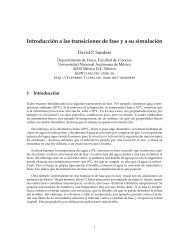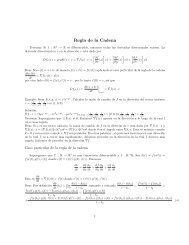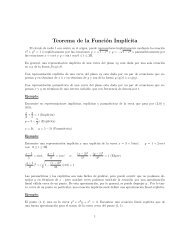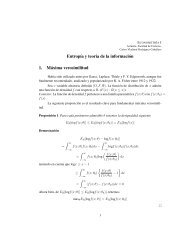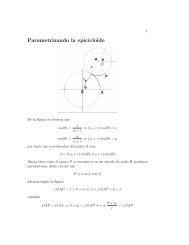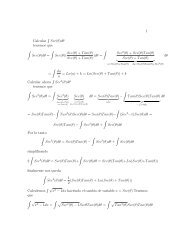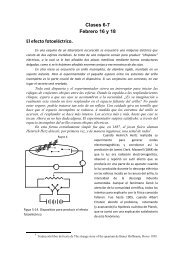"Surely You're Joking, Mr. Feynman!" - unam.
"Surely You're Joking, Mr. Feynman!" - unam.
"Surely You're Joking, Mr. Feynman!" - unam.
Create successful ePaper yourself
Turn your PDF publications into a flip-book with our unique Google optimized e-Paper software.
light reflected from the bay outside."<br />
Nobody said anything.<br />
Then I said, "Have you ever heard of Brewster's Angle?"<br />
"Yes, sir! Brewster's Angle is the angle at which light reflected from a medium<br />
with an index of refraction is completely polarized."<br />
"And which way is the light polarized when it's reflected?"<br />
"The light is polarized perpendicular to the plane of reflection, sir." Even now, I<br />
have to think about it; they knew it cold! They even knew the tangent of the angle equals<br />
the index!<br />
I said, "Well?"<br />
Still nothing. They had just told me that light reflected from a medium with an<br />
index, such as the bay outside, was polarized; they had even told me which way it was<br />
polarized.<br />
I said, "Look at the bay outside, through the polaroid. Now turn the polaroid."<br />
"Ooh, it's polarized!" they said.<br />
After a lot of investigation, I finally figured out that the students had memorized<br />
everything, but they didn't know what anything meant. When they heard "light that is<br />
reflected from a medium with an index," they didn't know that it meant a material such as<br />
water. They didn't know that the "direction of the light" is the direction in which you see<br />
something when you're looking at it, and so on. Everything was entirely memorized, yet<br />
nothing had been translated into meaningful words. So if I asked, "What is Brewster's<br />
Angle?" I'm going into the computer with the right keywords. But if I say, "Look at the<br />
water," nothing happens they don't have anything under "Look at the water"!<br />
Later I attended a lecture at the engineering school. The lecture went like this,<br />
translated into English: "Two bodies. . . are considered equivalent. . . if equal torques. . .<br />
will produce. . . equal acceleration. Two bodies, are considered equivalent, if equal<br />
torques, will produce equal acceleration." The students were all sitting there taking<br />
dictation, and when the professor repeated the sentence, they checked it to make sure they<br />
wrote it down all right. Then they wrote down the next sentence, and on and on. I was the<br />
only one who knew the professor was talking about objects with the same moment of<br />
inertia, and it was hard to figure out.<br />
I didn't see how they were going to learn anything from that. Here he was talking<br />
about moments of inertia, but there was no discussion about how hard it is to push a door<br />
open when you put heavy weights on the outside, compared to when you put them near<br />
the hinge nothing!<br />
After the lecture, I talked to a student: "You take all those notes what do you do<br />
with them?"<br />
"Oh, we study them," he says. "We'll have an exam."<br />
"What will the exam be like?"<br />
"Very easy. I can tell you now one of the questions." He looks at his notebook and<br />
says, " 'When are two bodies equivalent?' And the answer is, 'Two bodies are considered<br />
equivalent if equal torques will produce equal acceleration.' " So, you see, they could pass<br />
the examinations, and "learn" all this stuff, and not know anything at all, except what they<br />
had memorized.<br />
Then I went to an entrance exam for students coming into the engineering school.<br />
It was an oral exam, and I was allowed to listen to it. One of the students was absolutely



